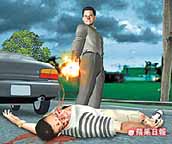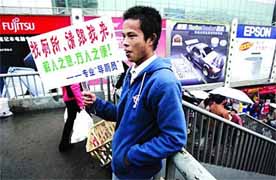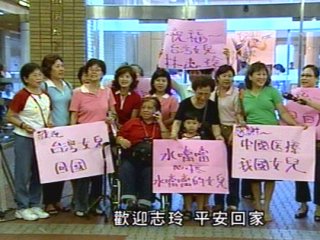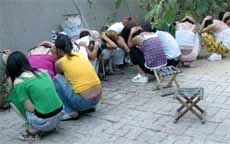Taking things for granted. In Baghdad and then in Beirut, I read of the latest “anti-terror” laws of Lord Blair of Kut Al-Amara. Of course, of course. After suicide bombers on the London Underground, what else do we expect? Our precious capital and its people must be protected. Having been three or four trains in front of the King’s Cross tube that exploded on July 7, I take these things seriously myself. And were I back on the London Tube today, I’d probably be trying to avoid young men with backpacks — as well as armed members of the Metropolitan Police. And after all the panjandrums in the press about our wonderful security forces, I’d also be taking a close look at these fine and patriotic folk. These are the men (and women?) who lied to us about weapons of mass destruction in Iraq.
These are the chaps who couldn’t get a single advance trace of even one of the four suicide bombings on July 7 (nor the un-lethal ones a few days later). These are the lads who gunned down a helpless civilian as he sat on a tube train.
But hold on a moment, I say to myself again. The July 7 bombings would be a comparatively quiet day in Baghdad. Was I not at the site of the An-Nahda bus station bombings after 43 civilians — as innocent, their lives just as precious as those of Londoners — were torn to pieces last week. At the Al-Kindi hospital, relatives had a problem identifying the dead. Heads were placed next to the wrong torsos, feet next to the wrong legs. A problem there. But there came not a groan from England. We were still locked into our July 7 trauma. No detectives are snooping around the An-Nahda bombsite looking for clues. They’re already four suicide bombs later. An-Nahda is history.
And it dawns on me, sitting on my balcony over the Mediterranean at the end of this week, that we take far too much for granted. We like to have little disconnects in our lives. Maybe this is the fault of daily journalism — where we encapsulate the world every 24 hours, then sleep on it and start a new history the next day in which we fail totally to realize that the narrative did not begin before last night’s deadline but weeks, months, years ago.






Contestant
Official totals Sina.com Sohu.com Yahoo! China MSN Netease Li Yuchun 3,528,308 234,977 17,441 116,627 134,494 28,846 Zhou Bichang 3,270,840 238,199 20,318 122,663 167,247 28,327 Zhang Liangying 1,353,906 161,423 39,694 111,372 488,276 28,327 They don't have the same kinds of visitors, do they?






Daniel Cappello: [Katie] Couric told you that she believes it is her responsibility as a journalist to explore and talk seriously about issues “that people need to know about to be informed citizens.” She then pursued an exclusive interview with Jennifer Wilbanks, the “runaway bride,” and defended it as a “terrific story.” Did you get a sense from any of the morning anchors that there was an internal conflict about what their journalistic mission is?
Ken Auletta: Most people don’t get out of bed in the morning believing they are going to do something tawdry. When they do, they rationalize it. At the networks—as throughout much of journalism—such rationalizations are commonplace. I don’t believe that Couric was lying to me when she said it was a “terrific story.” I believe she was lying to herself. An hour-long interview with the “runaway bride” is not why she entered journalism.


- 20%: perceived the local news media to be responsible in their reporting
- 34%: perceived the local news media to be irresponsible in their reporting- 64%: perceived the local news media had given full play to the freedom of speech
- 26%: perceived the local news media had not given full play to the freedom of speech- 66%: perceived that the local news media had misused/abused the freedom of press
- 20%: perceived that the local news media had not misused/abused the freedom of press- 40%: perceived that the local news media had practised self-censorship
- 40%: perceived that the local news media had not practised self-censorship- 32%: perceived that the local news media had scruples when criticizing the HKSAR government
- 60%: perceived that the local news media had no scruples when criticizing the HKSAR government- 60%: perceived that the local news media had scruples when criticizing the Central Government
- 28%: perceived that the local news media had no scruples when criticizing the Central Government


There was a popular coup that overthrew him [Chávez]. And what did the United States State Department do about it? Virtually nothing. And as a result, within about 48 hours that coup was broken; Chávez was back in power, but we had a chance to move in. He has destroyed the Venezuelan economy, and he's going to make that a launching pad for communist infiltration and Muslim extremism all over the continent.
You know, I don't know about this doctrine of assassination, but if he thinks we're trying to assassinate him, I think that we really ought to go ahead and do it. It's a whole lot cheaper than starting a war. And I don't think any oil shipments will stop. But this man is a terrific danger and the United ... This is in our sphere of influence, so we can't let this happen. We have the Monroe Doctrine, we have other doctrines that we have announced. And without question, this is a dangerous enemy to our south, controlling a huge pool of oil, that could hurt us very badly. We have the ability to take him out, and I think the time has come that we exercise that ability. We don't need another $200 billion war to get rid of one, you know, strong-arm dictator. It's a whole lot easier to have some of the covert operatives do the job and then get it over with.Is this a terrorist threat? Or an exercise of freedom of speech? Now plug in the name George W. Bush for Hugo Chávez, and the U.S. Secret Service will be paying the speaker a visit.
P.S. It is a federal felony to use instruments of interstate or foreign commerce to threaten other people. The statute is clear, and simple. Title 18 of the United States Code, Section 875(c), states: "Whoever transmits in interstate or foreign commerce any communication containing any threat to kidnap any person or any threat to injure the person of another, shall be fined under this title or imprisoned not more than five years, or both."





(Hardball) Chris Matthews on the situation in Iraq: "What I keep doing here is asking people on and off camera who come on this program, high-ranking officers, enlisted, former officers. I get sometimes, not all the time, two different versions, the version they give me on the air and the version they give me the minute when we're off the air. The version they give me when we're on the air is gung-ho, we're doing the right thing, everything is moving along. The version they give me off the air is, Rumsfeld is crazy. There aren't enough troops over there. We're not taking this seriously enough, or, we shouldn't be there, sometimes."

In the hours after a triple car bombing in the Iraqi capital Wednesday, state television broadcast a montage of faces of random children -- some appearing solemn, some smiling, some slyly glancing up at the camera. In the background, mournful music swelled, and the faces gave way to the bright flash of a car bomb, shown in slow motion. "They were young but were turned to pieces of flesh," the singers lamented, as the network then broadcast footage of previous attacks showing limp children, wailing men and distraught women dressed in black abayas pushing through crowds. "Oh, oh Iraq, the land of bloodshed.
So the official television channel of the sovereign and democratic government of Iraq was not beyond such methods. Whatever else, please don't tell me that everything is fine in Iraq and going according to plan.




















Why is it that, when the Chinese translate stuff from English or whatever to Chinese, do they have to add extra meaning on top of the tranlation itself? Risponde The Dustless Workshop (link segnalato dalla mia ultima scoperta, il curiosissimo EastSouthWestNorth).
Curiosissimo, indeed. Molto.























Conversation at the convenience store:
Clerk: You're not buying newspapers anymore.
Customer: No. Am I the only one?Clerk: It seems nobody is buying newspapers these days. Compeition is tough. We are still selling them at the same HK$6 with a free packet of tissue. But the newspaper stall down the street is selling them at HK$5.50 with a free packet of issue. And you obviously know about the free newspapers that are being distributed.
Customer: So there you have it. Why would I buy any newspapers here anymore?

























Archives